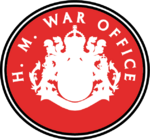War Office (Great Nortend): Difference between revisions
No edit summary |
|||
| Line 62: | Line 62: | ||
==Departments== | ==Departments== | ||
===Royal Quarry=== | ===Royal Quarry=== | ||
The Royal Quarry is the national office responsible for the supply of military supply such as ammunition, ordnance, firearms, uniforms, general stores, machinery and materiel. The Royal Quarrier is an office held by a senior officer of either the Armoury Corps (Royal Army) or the Batisment Corps (Navy Royal). Its symbol is a crossbow bolt or 'quarrel', depicted in a stylised fashion pointing down. Often, it resembles a triangle with a cross, lending it the nickname of the 'fishbone'. The pike-head is usually accompanied by the letters “R.Q.”. | The Royal Quarry is the national office responsible for the supply of military supply such as ammunition, ordnance, firearms, uniforms, general stores, machinery and materiel. The Royal Quarrier is an office held by a senior officer of either the Armoury Corps (Royal Army) or the Batisment Corps (Navy Royal). Its symbol is a crossbow bolt or 'quarrel', depicted in a stylised fashion pointing down. Often, it resembles a triangle with a cross, lending it the nickname of the 'fishbone'. The pike-head is usually accompanied by the letters “R.Q.”. | ||
===Board of Marischalty=== | |||
The Paymaster of the Army is the ministre with responsibility for administration of the [[Royal Army (Great Nortend)|Royal Army]]. Being in charge of Treasury funds expropriated for the Army, he is superior in practice to the Captain-General of the Forces, the operational head of the Army. The Paymaster sits on the Board of Marischalty, along with the King's Marischal as chairman, the Captain-General of the Forces, and certain Lieutenants-General. | |||
===Board of Admiralty=== | |||
Similar to the Royal Army, the Paymaster of the Navy is the government ministre responsible for the [[Navy Royal (Great Nortend)|Navy Royal]], wielding authority over the Admiral of the Fleets. The Paymaster sits on the Board of Admiralty, along with the Lord Admiral, the Admiral of the Fleets and the fleet Vice-Admirals. | |||
==Bureaucracy== | ==Bureaucracy== | ||
Revision as of 03:15, 20 November 2020
 | |
| Department overview | |
|---|---|
| Formed | 1734 |
| Jurisdiction | |
| Headquarters | War House, 3 Fettercourt |
| Minister responsible |
|
| Department executive |
|
His Majesty's War Office is the department of the Erbonian Government responsible for the administration and implementation of the Government defence and military policy. It is under the control of the Secretary of State for War, and operates in conjunction with the Royal Army and Navy Royal, and their respective commanders. It also governs the King's Cadet Corps.
The War Office takes a proactive role in defensive and offensive military actions on behalf of Great Nortend, rather than the primarily civil duties undertaken by the police constabularies and fire brigades. The distinction is blurred somewhat, however, by the numerous civil duties members of the military also undertake. Though there are no foreseeable armed military conflicts in the immediate region, the War Office regularly coordinates humanitarian, peace-keeping and offensive action with other Astyrian forces abroad.
Departments
Royal Quarry
The Royal Quarry is the national office responsible for the supply of military supply such as ammunition, ordnance, firearms, uniforms, general stores, machinery and materiel. The Royal Quarrier is an office held by a senior officer of either the Armoury Corps (Royal Army) or the Batisment Corps (Navy Royal). Its symbol is a crossbow bolt or 'quarrel', depicted in a stylised fashion pointing down. Often, it resembles a triangle with a cross, lending it the nickname of the 'fishbone'. The pike-head is usually accompanied by the letters “R.Q.”.
Board of Marischalty
The Paymaster of the Army is the ministre with responsibility for administration of the Royal Army. Being in charge of Treasury funds expropriated for the Army, he is superior in practice to the Captain-General of the Forces, the operational head of the Army. The Paymaster sits on the Board of Marischalty, along with the King's Marischal as chairman, the Captain-General of the Forces, and certain Lieutenants-General.
Board of Admiralty
Similar to the Royal Army, the Paymaster of the Navy is the government ministre responsible for the Navy Royal, wielding authority over the Admiral of the Fleets. The Paymaster sits on the Board of Admiralty, along with the Lord Admiral, the Admiral of the Fleets and the fleet Vice-Admirals.
Bureaucracy
The War Office is based at War House at 3 Fettercourt, Lendert-with-Cadell.
Ministerial officials
The civil head of the War Office is the Under-Secretary of the War Office. Appointees to the position traditionally do not have any professional military experience; however, with the introduction of muster service, all appointees have at least some conscript experience in the military.
Military officials
The Board of Lords and Staff (L.S.B.) are the senior military advisors to the Crown, though in practice reporting to the War Clerk and the Lord High Treasurer. The Board comprises the Lord High Admiral, the King's Marischal, the Captain of the Forces and the Admiral of the Fleets as well as senior military and naval staff and a Lieutenant of the Board who acts as secretary. The King's Marischal and Lord High Admiral only sit ex officio, and do not play a large role in the actual command of the armed forces.
This page is written in Erbonian English, which has its own spelling conventions (colour, travelled, centre, realise, instal, sobre, shew, artefact), and some terms that are used in it may be different or absent from other varieties of English. |
